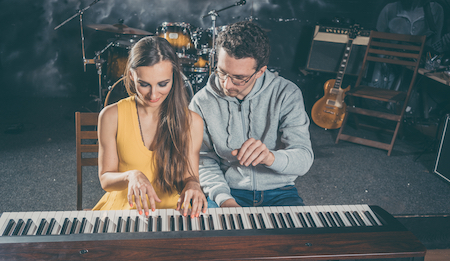If you have any music in your background, you know that learning to play an instrument can make you appreciate music on a higher level. You can feel the notes as you listen to a song. You can tap out the rhythm with your fingers. You can pick out the melody and harmony, creating a deeper understanding of what the composer desired from the song.
As an adult, you may remember your days in the high school band, or recall the years of piano lessons your parents gave you, before you let it go in pursuit of a career.
Now, you want to bring back your love of music once again. Learning piano as an adult is possible. In fact, for many adults, it’s easier than when they were a child.
Yet it’s important to remember that learning the piano as an adult will have its challenges. You won’t be able to play your favorite music at the start. To get really good at playing, it’s important to start with the basics. To get a thorough grasp of reading, playing, and understanding theory.
What can you expect?
The first six months are all about music theory. It’s about learning notes, getting a feel for the keyboard, and correcting your posture and hand position. You’ll start playing scales and learning music theory. You’ll begin to play basic songs. This is setting the stage for good playability in the future.
At the end of your first year, you’ll have worked up a variety of songs you can play well and enjoy playing. You’ll be comfortable with hand placement on the keyboard, knowing which notes to play and what keys to touch. You’ll be able to pick up simple songs and work them out easily. Playability comes with practice. The more practice you put into the music, the better you’ll be.
The second year moves into intermediate music. It’s when most instructors start introducing classical songs, and giving you a chance to perform if you desire. You should be able to play your favorite songs well, and understand how chords come together. Reading sheet music should be easy, and hand-eye coordination skills should allow you to play what you desire.
The third year is when you’re a seasoned piano player. You’re working on music theory, and grasping the concept of playing well by ear. You may dabble in composing your own music. You may start experimenting with playing with others. If you had a goal of playing your favorite songs, it should come easily by year three.
Where you go and how you pursue your dreams from this point forward is entirely up to you. The more you practice, the better you’ll be. Many piano players at this point pursue working with different teachers who can provide additional skills. You may wish to pursue learning more music theory, or form a band.
After several years of playing, you’ll be able to hear music in new and exciting ways. You’ll hear it in your favorite bands, and you may expand into new genres for an even deeper understanding of what music can do.
But it all starts with a desire. Learning to play the piano as an adult is possible. Is it for you?


